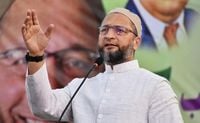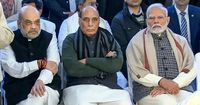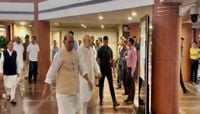In a solemn gathering marked by a two-minute silence for the victims of the Pahalgam terror attack, an all-party meeting was convened in the Parliament complex on Thursday evening, April 24, 2025. The meeting was called by the National Democratic Alliance (NDA) government in response to the tragic loss of 26 lives, primarily tourists, during a terrorist strike in Pahalgam, Jammu and Kashmir, on April 22. Union Minister Rajnath Singh chaired the meeting, which saw participation from key figures including Home Minister Amit Shah, Finance Minister Nirmala Sitharaman, Parliamentary Affairs Minister Kiren Rijiju, and Health Minister JP Nadda.
The atmosphere was heavy with grief as leaders from various political factions came together to discuss the implications of the attack. Among those present were Congress leader Rahul Gandhi, who had called for the meeting the night of the attack, and Mallikarjun Kharge, the Leader of Opposition in the Rajya Sabha. Other notable attendees included AAP MP Sanjay Singh, NCP leader Supriya Sule, and SP leader Ram Gopal Yadav.
Before the meeting commenced, a moment of silence was observed to honor the innocent lives lost. Video footage captured the solemnity of the moment, with leaders standing in respectful silence, reflecting the gravity of the situation. "We are here to send a strong and united message against terrorism," said Rajnath Singh as the meeting began.
The all-party meeting comes on the heels of the government's announcement of several measures targeting Pakistan, which were made in the aftermath of the Pahalgam attack. This includes downgrading diplomatic relations and suspending the Indus Waters Treaty of 1960. The decision to convene the meeting was made on April 23, with Singh and Shah reaching out to various parties to ensure a comprehensive discussion.
In a notable development, the All India Majlis-e-Ittehadul Muslimeen (AIMIM), led by Hyderabad MP Asaduddin Owaisi, was not invited to the meeting due to a participation threshold limiting attendance to parties with more than five MPs. Owaisi criticized this exclusion as "undemocratic," asserting that all voices should be heard in discussions concerning national security. "This is not about politics; it's about national unity against terrorism," he stated.
The meeting is part of a broader tradition in Indian politics where all-party discussions are convened following significant national security incidents. This practice was similarly observed after the Pulwama terror attack in 2019 and during the India-China standoff in 2020, underscoring the importance of collective political resolve in the face of terrorism.
In parallel with the all-party meeting, the Central government has been actively engaging with international diplomats to address the global implications of the Pahalgam attack. Foreign Secretary Vikram Misri led a series of briefings with envoys from key nations, including the US, UK, and EU, to inform them about India's response and to garner international support against terrorism.
The government’s robust diplomatic outreach aims to isolate terror sponsors and ensure that the global community is aligned in condemning such acts of violence. The Pahalgam attack has drawn widespread condemnation, with countries like Qatar expressing solidarity with India and denouncing terrorism in all forms.
As the situation unfolds, the Indian government has also taken steps to manage the immediate fallout from the attack. Following Pakistan's announcement of tit-for-tat measures, including the closure of its airspace to Indian airlines, domestic carriers like IndiGo and Air India have begun adjusting their flight routes to minimize disruption. IndiGo announced that some international flight schedules may be impacted, while Air India indicated that its flights to North America, the UK, Europe, and the Middle East would take alternative routes.
In a further response to the attack, the Jammu and Kashmir Cabinet convened an all-party meeting to express solidarity with the victims' families and to discuss security measures in the region. Democratic Progressive Azad Party President Ghulam Nabi Azad emphasized the unity of all communities in Jammu and Kashmir against terrorism, stating, "The whole nation and the people of J&K are standing in support of those who have lost their loved ones in the Pahalgam attack."
Moreover, Indian Army Chief General Upendra Dwivedi is scheduled to visit the site of the attack in Pahalgam to conduct a security review, further highlighting the government's commitment to addressing the security challenges posed by terrorism.
As the all-party meeting progresses, leaders are expected to discuss not only the immediate response to the Pahalgam attack but also long-term strategies to combat terrorism and enhance national security. The gathering represents a critical moment for Indian politics, as it seeks to project a unified front against the persistent threat of terrorism.
In the wake of such tragedies, the hope remains that political leaders can transcend party lines to forge a collective response that prioritizes the safety and security of all citizens.






